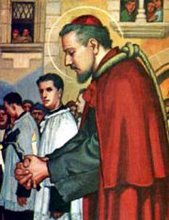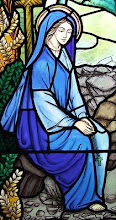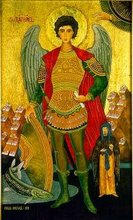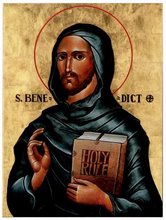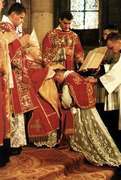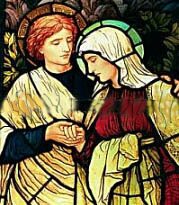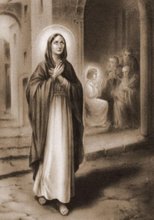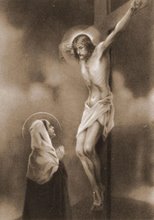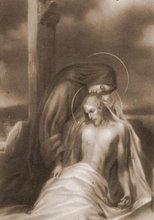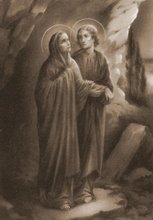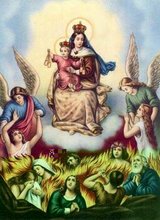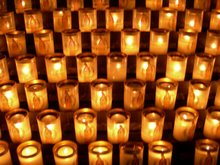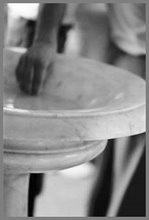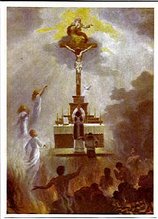This applies to every Catholic on the face of the earth:
"..let them who in grave peril are ranged against the Church seriously bear in mind that after 'Rome has spoken' they cannot be excused even by reasons of good faith. Certainly, their bond and duty of obedience toward the Church is much graver than that of those who as yet are related to the Church 'only by an unconscious desire.' Let them realize that they are children of the Church, lovingly nourished by her with the milk of doctrine and the sacraments, and hence, having heard the clear voice of their Mother, they cannot be excused from culpable ignorance, and therefore to them apply without any restriction that principle: submission to the Catholic Church and to the Sovereign Pontiff is required as necessary for salvation." -from the Holy Office (found here)
Let each and every one of us closely examine our conscience on this matter and swiftly put to death all beliefs which dissent from the Magisterial teachings of the Church. If you cannot do this on your own, pray the rosary every day for this intention - Mary will not fail the help you and speedily bring you to the Truth.
Thursday, July 31, 2008
Heroic Virtue I
So just what is heroic virtue? We know a person must have this to become a saint.
Benedict XIV described heroic virtue thus:
"In order to be heroic a Christian virtue must enable its owner to perform virtuous actions with uncommon promptitude, ease, and pleasure, from supernatural motives and without humanself-abnegation and full control over his natural inclinations."
An heroic virtue, then, is a habit of good conduct that has become a second nature, a new motive power stronger than all corresponding inborn inclinations, capable of rendering easy a series of acts each of which, for the ordinary man, would be beset with very great, if not insurmountable, diffulties. (source)
What this means is, in short - practice makes perfect. The older I get the more respect I have for those old sayings...they bear the wisdom of the ages. Heroic virtue is attainable, through God's good graces to every man, woman and child. We should all pray to become saints and to practice virtue in every small thing. When we fail, that is what confession is for.
Saturday, July 26, 2008
Sidebar Note
I don't know if anyone noticed, but I had deleted my list of favorite blogs several weeks ago. I did not do this out of spite, but for two very simple reasons:
1. I was spending too much time reading blogs and not enough praying.
2. I feared that the content of some blogs I linked to was becoming scandalous.
Therefore I have posted a new, abbreviated list of blogs and will try to keep a close eye on them. I am sorry if I offended anyone on my previously deleted list.
I have also added pictures and names of my new "set" of patron saints.
God Bless you all.
1. I was spending too much time reading blogs and not enough praying.
2. I feared that the content of some blogs I linked to was becoming scandalous.
Therefore I have posted a new, abbreviated list of blogs and will try to keep a close eye on them. I am sorry if I offended anyone on my previously deleted list.
I have also added pictures and names of my new "set" of patron saints.
God Bless you all.
Wednesday, July 23, 2008
Fortification of the Soul by Persecution
 "Persecutions fortify our souls and merit us Heaven"
"Persecutions fortify our souls and merit us Heaven"Another beauty from Holy Cards for your Inspiration
How to Preserve the Home & Achieve Family Peace

There is one way to have peace at home and in one's family - and ONLY one way. It is this:
"There is no surer means of calling down God's blessings upon the family....than the daily recitation of the rosary." -Pope Pius XII
"If families will listen to my message and give Our Lady ten minutes of their twenty-four hours by reciting the daily family rosary, I assure them that their homes will become, by God's grace, peaceful, prayerful places - little heavens, which God the Author of home life has intended they should be!" -Father Peyton
(source: The Secret of the Rosary by St. Louis de Montfort. Opening inside cover quote)
My family prays the rosary together, not every night, but most nights. Generally it takes about 25-30 minutes rather than the above stated 10. This is a blessed time for us and I often picture Mary there with us, standing before us as Our Lady of Grace showering us and our home with graces. I can tell you that this promise is true - for family who recite the rosary, however faultily and with distractions, peace and love with permeate your home. I have found that friends of our children, many of whom are not Catholic, will join us and after some initial resistance, they will on subsequent visits LOOK FORWARD to this time of prayer together. When I say resistance I do not mean that we coerce anyone to pray with us, nor do we demand anything. Its more like this "Ok everyone, its time for the rosary!" and the kids all gather together in various kneeling/sitting positions on pillows on the floor of our prayer room. No other activity is offered for guests, they are simply and without words invited to join us. We keep extra rosaries around for all the various friends who frequent the home.
We have gone to some lengths to assure that this room of our whole house is the most inviting, most beautiful and attractive place; warm soothing colors, rich woodwork, statues, candles, blessed incense - the works. We are not rich, but we placed our greatest efforts into this small, converted porch in order to be the center, the heart of our home.
If you make the Lord the more important person in your life and family, He will shower all of you with His abundant graces. I tell you this from my own experience.
May Mary's prayers go with you always. Amen+
Tuesday, July 22, 2008
Friday, July 18, 2008
Brown Scapular Devotion & Our Lady of Mount Carmel

Below is a small exerpt from an article I highly recommend to all Catholics regarding devotion to and the wearing of Our Lady's Brown Scapular. I must say I am terrified to be without mine and only reluctantly remove it in order to swim, shower and bathe. Get one, wear it always with love.
Church position
"With regard to the scapular as a conventional and sacred sign, the Church has intervened at various times in history to clarify its meaning, defend it, and confirm the privileges.
From these Church documents there emerges with sufficient clarity the nature and meaning of the Carmelite scapular."
From these Church documents there emerges with sufficient clarity the nature and meaning of the Carmelite scapular."
1. "The scapular is a Marian habit or garment. It is both a sign and pledge. A sign of belonging to Mary; a pledge of her motherly protection, not only in this life but after death."
2. "As a sign, it is a conventional sign signifying three elements strictly joined: first, belonging to a religious family particularly devoted to Mary, especially dear to Mary, the Carmelite Order; second, consecration to Mary, devotion to and trust in her Immaculate Heart; third an incitement to become like Mary by imitating her virtues, above all her humility, chastity, and spirit of prayer."
"This is the Church's officially established connection between the sign and that which is signified by the sign."
Go here for the full article on Zenit.
Labels:
Brown Scapular,
great articles
Tuesday, July 15, 2008
Private Prayer for the Dead

Praying for the dead is an act of charity. This is not only a pious practice, but is indeed a duty for us all. The more you assist the holy souls with your alms, the more you help yourself. We especially have the duty to pray for our loved ones and relatives.
In addition to having a Mass said on the anniversary of a loved one's death, there exists an old Christian custom of fasting, burning a candle for 24 hours, and praying for them on this day (this custom was adopted by Jews in the Middle Ages; they call it "Jahrzeit" as did the medieval German Christians.) Any orthodox traditional or improvised prayer can be prayed at this time, but the Rosary is always appropriate and can be prayed now (or any time) for the dead, offered in the same way it is at Catholic funerals -- i.e., with the Fatima Prayer replaced (or in addition to) the Eternal Rest Prayer. The Eternal Rest prayer is also prayed by itself, offered any time for the dead, when visiting grave sites, and when passing cemeteries. It is a prayer every Catholic should know by heart:
Eternal rest grant unto them, O Lord; and let perpetual light shine upon them. May they rest in peace. Amen.
Réquiem ætérnam dona ei (eis) Dómine; et lux perpétua lúceat ei (eis). Requiéscat (Requiéscant) in pace. Amen.
We may also pray for our dead every time we eat if we pray the After Meal Blessing, another prayer every Catholic should know by heart:
We give Thee thanks for all Thy benefits, O Almighty God, Who livest and reignest forever. And may the souls of the faithful departed, through the mercy of God, rest in peace. Amen.
Agimus tibi gratias, omnipotens Deus, pro universis beneficiis tuis, qui vivis et regnas in saecula saeculorum. Fidelium animae, per misericordiam Dei, requiescant in pace. Amen.
The Penitential Psalms -- i.e., Psalms 6, 31, 37, 50, 101, 129, 142 -- are also prayed for the dead, especially the 129th Psalm, known as De Profundis.
Monday, July 14, 2008
Holy Face of Jesus

"Arise oh Lord and let thy enemies be scattered.
Let those who hate thee, fly before thy holy face." Amen+
Let those who hate thee, fly before thy holy face." Amen+
(source)
About Prayer for the Dead
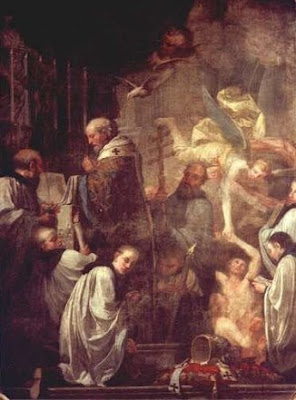
Below is an excellent and consise decription in laymen's terms of the Catholic teaching regarding prayer for the dead.
II Maccabees 12:43-46: "And making a gathering, he [Judas] sent twelve thousand drachms of silver to Jerusalem for sacrifice to be offered for the sins of the dead, thinking well and religiously concerning the resurrection, (For if he had not hoped that they that were slain should rise again, it would have seemed superfluous and vain to pray for the dead,) And because he considered that they who had fallen asleep with godliness, had great grace laid up for them. It is therefore a holy and wholesome thought to pray for the dead, that they may be loosed from sins."
Those who've died in a state of grace are not truly "dead"; they are our beloved in Heaven or in Purgatory (on their way to Heaven) and will forever be, world without end, part of the Communion of Saints -- the Church Triumphant (the Saints in Heaven, whether or not they are beatified or canonized), the Church Suffering (the saints in Purgatory), and the Church Militant (the saints on earth).
Because we can't know, aside from those the Church has beatified or canonized, who is already in Heaven, who is in Purgatory for a time, or who is damned, we pray for the dead for the rest of our lives -- assuming they are in Purgatory, while hoping they are in Heaven and not damned.
We also ask those who've died to pray for us. While those whom the Church has deemed to be of the Church Triumphant (the canonized Saints) are in Heaven for certain and are, therefore, in no need of our prayers for them, we've always asked for them to pray for us. As to the Church Suffering in Purgatory, Aquinas teaches that they are not able to know, by themselves, our prayers; however, it is piously believed, and taught by St. Alphonsus Liguori, that God makes our prayers known to them -- not directly, as they are deprived of the Beatific Vision until they enter Heaven, but by infusing this knowledge into their souls. St. Bellarmine teaches that because the Church Suffering is so close to God -- much closer than we are and having the great consolation of knowing they are saved -- their prayers for us are very effective. So, as you pray for your dead loved ones, ask them to pray for you, too!
As to the damned, there is no hope; no prayer can help them and we can't pray formally for those in Hell. The problem, of course, is that we can't know who is damned, and so we pray generally for "all the faithful departed." For those who've died outside of visible Communion with Christ's Church or for those Catholics who've died seemingly without repentance and in scandal, public prayer cannot be offered, but we can most certainly still pray privately with the hope that they've died in a state of grace (i.e., those who are denied a Catholic funeral can't be prayed for liturgically, publicly, but they can most definitely be prayed for -- and should be prayed for -- privately). Priests can even offer Masses for such people privately, without naming them.
(source)
Saturday, July 12, 2008
Virgin and Martyr
 This is the effigy of St. Maria Goretti which is situated directly upon the spot where Allesandro Serinelli killed her. She was found my Serinelli's father upon the floor, right here. Maria was unconscious, but still alive following 14 stab wounds inflicted upon her as she resisted being raped. Her murderer had been harassing Maria for months prior to this event, trying to get Maria to give into his impure desires. She always and unfailingly resisted. Finally Alessandro would have his way and would not take no for an answer. As she resisted, he wrestled this 12 year old girl to the floor, with the knife poised over her head, she was given a choice, death or sin. She chose the better part.
This is the effigy of St. Maria Goretti which is situated directly upon the spot where Allesandro Serinelli killed her. She was found my Serinelli's father upon the floor, right here. Maria was unconscious, but still alive following 14 stab wounds inflicted upon her as she resisted being raped. Her murderer had been harassing Maria for months prior to this event, trying to get Maria to give into his impure desires. She always and unfailingly resisted. Finally Alessandro would have his way and would not take no for an answer. As she resisted, he wrestled this 12 year old girl to the floor, with the knife poised over her head, she was given a choice, death or sin. She chose the better part.At times in prayer, in spirit I go this place and kneel upon the cold stone floor. Here beside the place of Maria's triumph, I try to give honor to this heroic virgin martyr and beseech her prayers on my behalf. I entrust my and my family's purity to her prayers. I pray that given the same choice, death or sin, that her prayers will enable us to make the same choice.
Saint Maria Goretti - Ora Pro Nobis! Amen+
Friday, July 11, 2008
Days of the Dead

The entire month of November is devoted to the Poor Souls in Purgatory, and Rosaries for the dead are offered during this time (with the Eternal Rest prayer replacing the Fatima prayer as above). The month-long devotion to the Souls in Purgatory begins with the three consecutive "Days of the Dead" at the end of October and early November: The Days of the Dead are:
All Hallows' Eve: 31 October, the day on which we unofficially recall the realities of Hell and how to avoid it;
All Saints Day, or All Hallows' Day: 1 November, the day on which we officially honor God's Saints of the Church Triumphant; and
All Souls Day: 2 November, the day on which we officially commemorate and pray for all the faithful departed of the Church Suffering.
Some Catholics might pray a Novena for the Holy Souls, the All Souls Novena, or some other such Novena beginning on 24 October and ending on All Saints Day (the eve All Souls Day). Then, after sunset on All Saints Day, we light a candle (preferably one that that had been blessed at Candlemas) and pray the Rosary for the dead. The next day, 2 November, being All Souls Day, we can offer public prayer for the dead by attending one of the three Masses offered for the dead on that day. We also visit the graves of our family members, seeking those special indulgences for them that are only offered on All Souls Day and during the Octave of All Saints:
A plenary indulgence, applicable only to the souls in Purgatory, may be gained on the 2nd by making a pious visit to a church to pray a Pater and the Creed, and
A plenary indulgence, applicable only to the Souls in Purgatory, may also be gained fron 1 November to 8 November by visiting loved ones' graves and praying the Eternal Rest prayer for their peace.
We are not limited to indulgences for the dead on these Days of the Dead, however. Indulgenced works, prayer, votive offerings, alms-giving, etc., may always be offered for the dead, at any time of the year. Note that those in Purgatory are also especially remembered on Ember Days. Also note that because those in Purgatory are no longer under the jurisdiction of the Church Militant, all the above prayers, indulgences, and works for the dead are offered by way of beseeching God to apply them for the relief of the Church Suffering.
Thursday, July 10, 2008
How to Avoid Purgatory

Twelve steps to be used to avoid going to purgatory after death. These are also spiritual practices that will not fail to bring you to the heights of holiness.
12 Steps to Avoid Purgatory
1. In every prayer you say, every Mass you hear, every Communion you receive, every good work you perform have the express intention of imploring God to grant you a holy and happy death and no Purgatory. Surely God will hear a prayer said with such confidence and perseverance.
1. In every prayer you say, every Mass you hear, every Communion you receive, every good work you perform have the express intention of imploring God to grant you a holy and happy death and no Purgatory. Surely God will hear a prayer said with such confidence and perseverance.
2. Always wish to do God’s will. It is in every sense the best for you. When you do or seek anything that is not God’s will, you are sure to suffer. Say, therefore, fervently each time you recite the Our Father: Thy will be done.
3. Accept all the sufferings, sorrows, pains and disappointments of life, be they great or small, ill health, loss of goods, the death of your dear ones, heat or cold, rain or sunshine as coming from God. Bear them calmly and patiently for love of Him and in penance for your sins. Of course, one may use all his efforts to ward off trouble and pain, but when one cannot avoid it let him bear it patiently. Impatience and revolt make sufferings vastly greater and more difficult to bear.
4. The greatest act in Christ’s life was His Passion. As He had a Passion so each one of us has a Passion. Our Passion consists in the sufferings and labors of every day. Therefore, let us do our work, accept its disappointments and hardships and bear our pains in union with the Passion of Christ. We gain more merit by a little pain than by years of pleasure.
5. Forgive all injuries and offences for in proportion, as we forgive others, God forgives us. Go to confession. This sacrament does more than “just” rid us of our sins; it gives us a tremendous increase in sanctifying grace. It wins for us a higher place in Heaven, with increased union with God. Each time we go to confession, we are preserved from many dangers and misfortunes which might otherwise have befallen us. A devout confession helps us to hear the inspirations of the Holy Spirit, and to hear and follow the advice of our guardian angels.
6. Avoid mortal sins, deliberate venial sins and break off bad habits. Then it will be relatively easy to satisfy God’s justice for sins of frailty. Above all avoid sins against charity and chastity in thought, word and deed for these sins are the reason why many souls are detained in Purgatory for a long time.
7. If afraid of doing too much work, do many little things, acts of kindness and charity, give the alms you can, don’t grumble or complain when things are not as you please, don’t complain of others, never refuse to do a favor for others when possible. These and such acts are a splendid penance.
8. Do all in your power for the Holy Souls in Purgatory. Pray for them constantly, get others to do so, join the Friends of the Poor Souls and ask all those you know to do likewise. The Holy Souls will repay you most generously.
9. There is no more powerful way of obtaining from God a most holy and happy death than by weekly confession, daily Mass and daily communion. Masses may be arranged after or before someone’s death to expedite their time in Purgatory.
10. A daily visit to the Blessed Sacrament – if only for three or four minutes – is an easy way of obtaining the same grace. Kneel in the presence of Jesus with eyes fixed on the Tabernacle or Monstrance, sure that He is looking at you, then repeat little prayers like these: My Jesus, Mercy. My Jesus, have pity on me a sinner. My Jesus, I love you. My Jesus, give me a happy death.
11. Enroll in and wear the Brown Scapular of Our Lady of Mount Carmel. “Whosoever dies clothed in this scapular shall not suffer eternal fire.” This is the Blessed Virgin Mary’s Promise, made July 16, 1251 to St. Simon Stock. The Sabbatine Privilege is Mary’s promise to release from Purgatory soon after death all those who: 1) wear the brown scapular 2) observe chastity according to their state in life and 3) say the Little Office of the Blessed Virgin Mary every day. To be eligible for this scapular promise, one must be enrolled in the Family of Carmel. This is a simple ceremony which takes only a moment and may be done by any Carmelite or duly authorized priest. Mary’s motherhood is not limited to Catholics. It is extended to all men. Many miracles of conversion have been wrought in favor of non-Catholics who have practiced the scapular devotion.
12. Use holy water. Holy water is a sacramental that remits venial sin. Because of the blessing attached to it, Holy Church strongly encourages its use upon her children especially when danger threatens such as fire, storms, sickness and other calamities. Every Catholic home should have a supply of holy water. Keep your soul beautifully pure in God’s sight by making the Sign of the Cross carefully while saying: “By this holy water and by Thy Precious Blood, wash away all my sins and the sins of the Poor Souls in Purgatory, O Lord”.
I would add one more sure way to avoid purgatory yourself ~ after prayerful discernment, take this vow:
Heroic Act of Charity
O Holy and Adorable Trinity, desiring to aid in the relief and release of the Holy Souls in Purgatory, through my devotion to the Blessed Virgin Mary, I cede and renounce, on behalf of these souls, all the satisfactory part of my works, and all the suffrages which may be given to me after my death. In their entirety, I offer them to Mary, the Most Holy Mother of God, that she may use them, according to her good pleasure, for those souls of the faithful departed whom she desires to alleviate their suffering. O my God, deign to accept and bless my offering which I make to Thee through the most august Queen of Heaven and Earth. Amen.
Learn more here.
I would also suggest taking an additional vow of non-revocation to the above - show God you are really serious and also prevent the loss of so much merit in your dying frailty.
Monday, July 7, 2008
Persecution & Martyrdom, Part VII

Blessed John Nelson
1534-February 3, 1578
English Jesuit martyr
executed during the reign of Elizabeth I.
Nelson was from Skelton, near York. He was nearing 40 when he left for Douai in 1573 for training as a priest. Two of his four brothers would later follow him there to become priests. He was ordained at Binche in Hainaut by Monsignor Louis de Berlaymont, Archbishop of Cambrai, on June 11, 1576. The next November, he left for his mission, which appears to have been in London. He was arrested on December 1, 1578, "late in the evening as he was saying the Nocturne of the Matins for the next day following", and put in Newgate prison.
When interrogated about a week or so later, he refused to take the oath recognizing the Queen's supremacy in spiritual matters, and was induced by the commissioners to declare the Queen a schismatic. Under the Legislation of 1571, this was high treason and punishable by death. He was condemned a few weeks later on Saturday February 1, 1578 and was confined after the trial in an underground dungeon in the Tower of London, the so called Pit of the Tower. While in prison he subsided on bread and water and was able to say Mass and confess.
On his execution day, he refused several Protestant ministers after meeting family members. Taken to Tyburn and was allowed to speak before the bystanders, who were mostly hostile in the historically Protestant London. He refused to ask pardon of the Queen and asked any Catholics in the crowd to pray with him as he recited several common prayers in Latin.
He was hung and cut down alive, then quartered. As the executioner plucked out his heart, his last words were reportedly "I forgive the queen and all the authors of my death." (source)
Look at the Catholic witnesses in England and pray, for our time is approaching.
Act of Resignation
O Lord, my God, from this day I accept from your hand willingly and with submission, the kind of death that it may please you to send me, with all its sorrows, pains, and anguish. Into your hands, O Lord, I commend my spirit. Do with me what You will. Amen+
Thursday, July 3, 2008
Persecution & Martyrdom, Part VI
January 24, 1540 – December 1, 1581
English Jesuit priest and martyr.
He was kept a long time in prison, twice racked (by order of the Council but certainly with Elizabeth's consent), and every effort was made to shake his defiance. Despite the effect of a false rumour of retraction and a forged confession, his adversaries summoned him to four public conferences (September 1 18, 23 and 27 1581). Although still suffering from his ill treatment, and allowed neither time nor books for preparation, he reportedly conducted himself so easily and readily that he won the admiration of most of the audience. Tortured again on October 31, he was indicted at Westminster on a charge of having conspired, along with others, in Rome and Reims to raise a sedition in the realm and dethrone the Queen.
He was sentenced to death as a traitor, which he answered with the prophetic words "In condemning us, you condemn all your ancestors, all the ancient bishops and kings, all that was once the glory of England" and with the Te Deum laudamus, and, after spending his last days in prayer, was led with two companions to Tyburn and hanged, drawn and quartered on December 1, 1581, aged 41.
The ropes used in his execution are now kept in glass display tubes at Stonyhurst College in Lancashire; each year they are placed on the altar of St Peter's Church for mass to celebrate Campion's feast day.
(source)
Look at the Catholic witnesses in England and pray, for our time is approaching.
Act of Resignation
Act of Resignation
O Lord, my God, from this day I accept from your hand willingly and with submission, the kind of death that it may please you to send me, with all its sorrows, pains, and anguish. Into your hands, O Lord, I commend my spirit. Do with me what You will. Amen+
Tuesday, July 1, 2008
Persecution & Martyrdom, Part V

Blessed Thomas Abel (c. 1497 – 30 July 1540)
Imprisoned in the Tower of London, in the Beauchamp Tower, he carved the above rebus, or visual pun, on the wall: a play on his name, 'A-bell'
Thomas was an English priest who was martyred during the reign of Henry VIII. His place and date of his birth are unknown.
He was educated at Oxford and entered the service of Queen Catherine of Aragon as her chaplain some time before 1528 and appears to have taught the queen modern languages and music. Catherine sent him to Spain in 1528 to the emperor Charles V on a mission relating to the proposed divorce. On his return she presented him with the parochial benefice of Bradwell, in Sussex,and remained to the last a staunch supporter of the unfortunate queen in the case of the validity of her marriage with Henry VIII.
In 1532, he published his Invicta Veritas, an answer to the determination of the most famous Universities, that by no manner of law it may be lawful for King Henry to be divorced from the Queen's grace, his lawful and very wife (with the fictitious pressmark of Luneberge, to avoid suspicion). The work contained an answer to the numerous tracts supporting Henry's ecclesiastical claims. For this he was thrown into Beauchamp Tower, and after a year's liberation again imprisoned, in December, 1533, on the charges of disseminating the prophecies of the Maid of Kent, encouraging the queen "obstinately to persist in her wilful opinion against the same divorce and separation", and maintaining her right to the title of queen. He was kept in close confinement until his execution at Tyburn, two days after the execution of Thomas Cromwell. There is still to be seen on the wall of his prison in the Tower of London a rebus consisting of the symbol of a bell with an A upon it and the name Thomas above, which he carved during his confinement. He was beatified by Pope Leo XIII as one of a group of fifty-four English Martyrs on 29 December 1886.
There is extant a very pious Latin letter written by him to a fellow-martyr, and another to Cromwell, begging for some slight mitigation of his "close prison"; "license to go to church and say Mass here within the Tower and for to lie in some house upon the Green". It is signed "by your daily bedeman, Thomas Abell, priest". His act of attainder states that he and three others "have most traitorously adhered themselves unto the bishop of Rome, being a common enemy unto your Majesty and this your Realm, refusing your Highness to be our and their Supreme Head of this your Realm of England" (source)
Look at the Catholic witnesses in England and pray, for our time is approaching.
Act of Resignation
O Lord, my God, from this day I accept from your hand willingly and with submission, the kind of death that it may please you to send me, with all its sorrows, pains, and anguish. Into your hands, O Lord, I commend my spirit. Do with me what You will. Amen+
Subscribe to:
Posts (Atom)






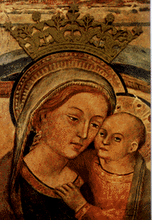


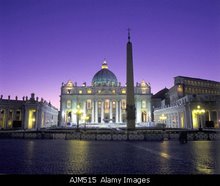

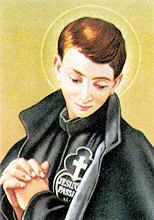
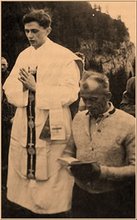
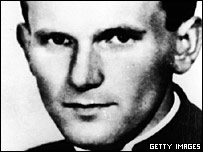
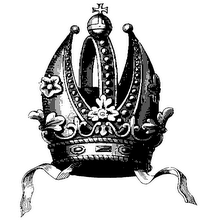
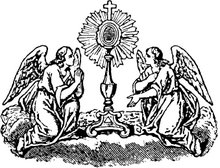
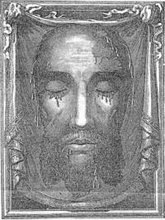
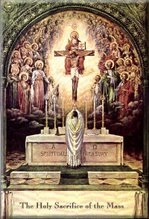

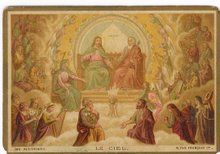




01.jpg)


